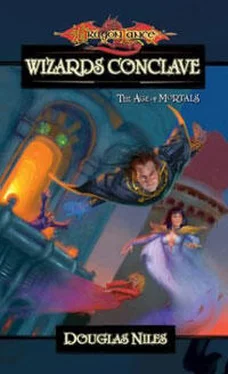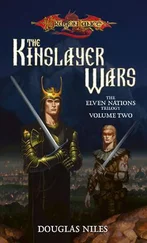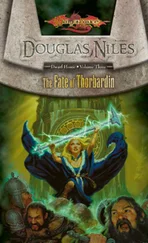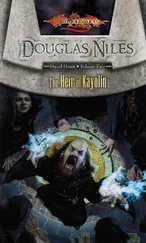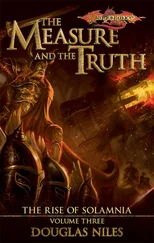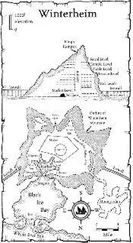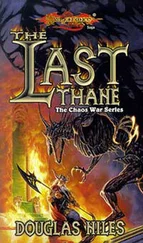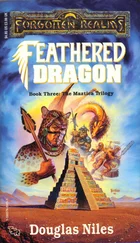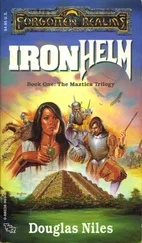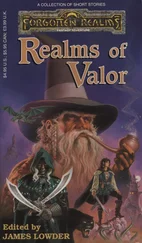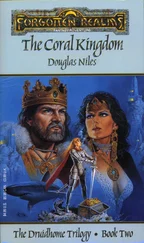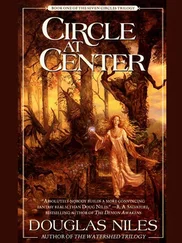Douglas Niles
Wizards Conclave
When the War of Souls ended, the gods of magic returned to their own cosmos together with all of their immortal kin among the pantheon of Krynn. For long years they had dwelled in banishment, their world stolen away by the treachery of the late and unlamented Dark Queen. Their world had been bereft of godly magic for decades, and all were cognizant of the fact that there was much work to be done. In the time-honored manner of gods—and mortals as well—they immediately began to flex their respective might in competition with their fellows.
Each returning god, male or female, master or mistress of major or minor creed, had, of course, a somewhat narrow scope of interest. Zeboim turned to the seas, the briny landscape of her nearly limitless domain, while Sargonnas reveled in the martial splendor of his minotaurs. Shinare gently nudged her worshipers toward a restoration of the trade and commerce that was her lifeblood and joy. Reorx spoke to his dwarves, his basso voice thrumming up from the bedrock, reaching the stocky mountain folk through dreams and clerics, urging them to set aside their clannish differences, and to apply themselves jointly to the advancement of the race. Some gods worked for the cause of good, others for evil; while the neutral gods strived to maintain the ancient Balance that had long been the most stable force in the world.
The three immortal cousins who were the gods of magic each had distinct plans, schemes, agendas. Yet they shared a closeness that was foreign to the other gods, a connection no other immortals could know. In their guises of black, red, and white, they embodied evil, neutrality, and good. As moons, they once again waxed and waned in the skies over the world. Two of them were visible to the eyes of men, while the third—the black moon—remained an unseen presence that was, nevertheless, keenly potent.
The gods of magic knew that, during the decades of their absence, foul sorceries had arisen among the mortals. This wild sorcery was an affront to true magic power, an abomination in the eyes of the gods. Yet it lurked and grew and swirled throughout the world, a blanket of corruption cloaking the land and—an even greater abomination—clouding the minds of the wizards who might otherwise have welcomed the return of their ancient lords. Each god of magic yearned for a return of true arcane power, and each set about restoring the faith, and the powers, of loyal followers.
Nuitari, the black moon, sent a summons to the world of Krynn, commanding his practitioners to once again take up their spellbooks and potions, to plot and scheme for the furtherance of the Black Robes among the lands of dragons, men, and all the lesser peoples of the world. Those followers were ordered to restore the glory of that mighty order, a glory revealed in the fear it provoked in the souls of all the creatures of the world.
Nuitari’s female cousin, Lunitari the Red, likewise sent out a call. The Red Robes were to gather in her name and await her commands. She would organize them and grant them her favor, and they would once again be a force upon Krynn. The message went to all corners of the world, thrumming with power and truth: the Red Robes must awaken and arise, seizing their crucial position astride the fulcrum of the Balance, striving for prominence and mastery among the Orders of Magic and the councils of men.
Even Solinari, the gleaming perfect circle of the white moon, felt the competition, the resurgence of power, and the threat to his primacy presented by the foul pollution of wild magic. Solinari knew the nature of his ambitious cousins, and understood that might must be met with greater might. So he, too, directed his attentions toward the world, and made to pull the wearers of the White Robe into a council of magical power, a meeting to allow them to plan the future course of true magic in the world. Evil and apathy were the threat, and the stern guidance of the white wizards was needed to hold the world on a steady path.
But Solinari’s command, like those of Nuitari and Lunitari, went unheard in the world. The magic users were scattered; those who survived were uniformly elderly—since they had, by necessity, completed their training in an earlier age—and the gods of magic were unable to draw them back into the fold.
“It is the curse of the wild magic,” observed the god of black magic, when at last his fury settled enough to allow reflection. “It runs rampant in the world, drawing those who have talent away from us and toward its own ruinous ends. It is corruption and betrayal, and it bars the way to our full return.”
“I tried to battle this wild magic,” said Lunitari. “But it was a force too strong; it turned me back at every angle, every corner. I could find no chink in its arcane armor. And it has seized the souls of those who would otherwise raise us to our deserved glory.”
“Nor could I reach into the world as I desired,” admitted Solinari, though perhaps he was not as surprised as his cousins. “For more than thirty of Krynn’s years, the forces of wild magic have grown in power, while our own faithful have been left to languish with no proof even that their gods existed, much less that they would have been able to cast the spells, to work the alchemies, to brew the potions that had been instinctive truths upon the world for as many centuries as we three moons have roamed the skies.”
“Are you suggesting that we are done and defeated, then?” growled Nuitari, lightning and hellfire sparkling in the depths of his colorless void. “I will never admit to that! I will fight, and if I must die, then the world will see me perish in glory and devastation!”
And the black moon spewed forth a great storm in the night, lighting and assailing the world with crackling bolts, sending them searing into the crests of mountains, the tops of tall trees, the steeples and parapets of lofty buildings. Each hissing missile was composed of pure magic, but as these bolts smote the world, they were snuffed into nothingness, leaving no fire, no hint of smoke or char. Instead their magical power melted into the wild sorcery that held such sway in the world.
“Nor shall I acknowledge this foul adversary!” chimed in Lunitari, surrounded by a blazing corona of flames. “I will blaze my way into Krynn and once again claim my rightful place above the world!”
And she sent a cascade of meteors plunging from the heavens, arcane chunks that had been torn from the very fabric of magical power. These burned through the skies with terrifying majesty, streaking bright colors, thundering with crushing roars of sound, but when they struck the surface of the world, they vanished. They left no mark upon the ground, nor did the impacts create any sound audible to the awestruck humans, elves, draconians, and others who witnessed the essence of magic smash into the earth. Instead the magic was absorbed by the fabric of the world, and the core of wild sorcery flourished and grew.
It was white Solinari who voiced a plea for unity. “We cannot hurl ourselves against the world at random, disparate and competing in our aims. We must work together, a godly model for the Conclave we desire upon Krynn.”
“What use, that?” Nuitari’s voice dripped contempt. “My deepest might, thrown lustily and with abiding hatred and vengeance, caused not a blink among the peoples of the world!”
“We must focus our attention, combine our presence, and direct it at a single place in the world where we can reenter Krynn and form a base of power!” Lunitari declared. “A target we can empower utterly and completely.”
“The tower of magic, of course!” Now the god of black magic understood, and he sounded delighted and enthused. “We must awaken the Tower of High Sorcery in Wayreth Forest!”
Читать дальше
